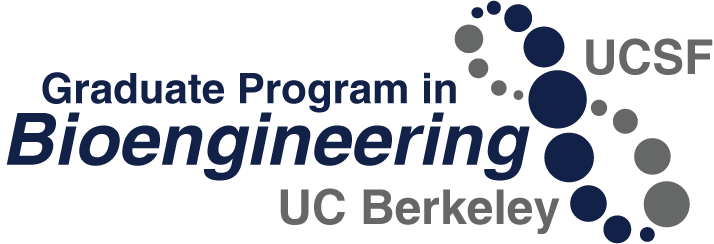Coursework
In general, the program of study includes a major and a minor field of study. Due to the wide variety of topics included in bioengineering and the variety of student interests, major and minor sub fields will be chosen by the student in consultation with their primary graduate adviser, taking into account the student’s prior training, research interests and career goals. Students who already hold a Master’s degree or other professional degree (M.D., D.D.S., or D.V.M.) may not be required to complete minor coursework. Sixteen semester units of graduate level coursework must be taken in the major field and eight units of upper division or graduate coursework in the minor field, exclusive of seminars and research. The course requirements are designed to develop a strong and useful knowledge base in both biology and engineering. Students must also enroll in two graduate seminar courses and complete two semester or three quarter units in ethics. In addition, all students in the Ph.D. program are required to have completed, at some time during their academic career, the Area Requirements described below. Most students will have completed some of these courses prior to initiating the Ph.D. program; any remaining coursework will be integrated into the graduate program of study.
- Anatomy, physiology, and biology: 9 semester or 13.5 quarter units of upper division or graduate level coursework.
- Biochemistry and/or intermediate chemistry: 3 semester or 4.5 quarter units of upper division or graduate level coursework.
- Engineering and/or computer science: 7 semester or 10.5 quarter units of upper division or graduate level coursework.
- Mathematics and/or statistics: 2 semester or 3 quarter units of upper division or graduate level coursework.
Laboratory Rotations
The objective of the research rotation is to allow students to become familiar with different areas of research, learn new experimental techniques, obtain experience in unique research laboratories, and ultimately to identify a lab in which to conduct dissertation research. The research being performed during a rotation may correspond to the initial stages of a thesis project or may be on a totally different topic.
Students should perform three 8-week rotations in different joint graduate group faculty laboratories during the first year. The rotation schedule corresponds roughly with the UCSF quarter system and should facilitate placement of most students in the thesis lab by July 1 of the first academic year. Actual dates will vary by year and will be clearly publicized.
Current students may view the BioE Faculty Rotations and Lab Openings sheet as a resource to facilitate connections with faculty members.
Performance during a rotation is evaluated by the rotation sponsor (faculty member), who submits a written report at the conclusion of the rotation period. Progress is monitored by the head graduate advisors, who review rotation evaluation reports and assign course credit for work performed. Students will be invited to present their results to faculty and peers at the end of each semester.
For more information, see the Rotations section of the Graduate Handbook.
Teaching
Anticipating future careers which may include teaching, all graduate students participate in undergraduate instruction by serving as Graduate Student Instructors (GSIs) for at least one semester. Students typically complete this requirement during their second year and these assignments may include lecture or laboratory courses and are generally based upon student preferences. Advanced graduate students may also be allowed to serve as a GSI for a second semester or organize seminars for junior- and senior-level undergraduates for additional teaching experience with the approval of the student’s graduate adviser and thesis mentor.
For more information, see the GSI section of the Graduate Handbook.
Qualifying Examination
An oral qualifying examination must be taken in the spring of the second year or the fall of the third year. The deadline is December of the third year. In this examination, students demonstrate their ability to recognize research problems of fundamental importance, to propose appropriate experimental approaches to address these problems, and to display comprehensive knowledge of their disciplinary area and related subjects.
The oral examination is administered by a committee composed of four faculty members who are selected by the student with the advice of their Graduate Adviser and Research Mentor, and then appointed by the Graduate Division on the student’s Home Campus. Everyone on the committee must be members of the academic senate at UCSF or Berkeley and reflect the breadth of the student’s background, with expertise in the areas specified in the major and minor Program of Study.
For more information see the Qualifying Examination section of the Graduate Handbook.
Dissertation Work
After advancing to candidacy a student meets each fall semester with his or her Thesis Committee to discuss the dissertation project, to review results, and to chart directions in their third and subsequent years. In the final years in the program, students complete a dissertation based on original laboratory research. It generally takes five and a half years to complete the doctoral program.
Information regarding institutional requirements for graduate degrees at UCB and UCSF can be found at the Berkeley Graduate Division and UCSF Graduate Division.

